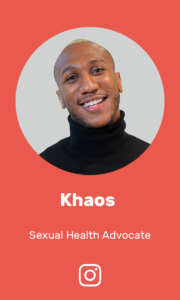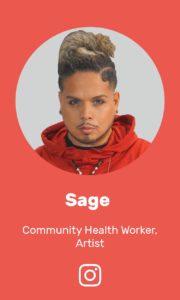SMASH
ABOUT
SMASH (Social Media and Sexual Health) was created in the belief that all people have the right to make informed and empowered sexual health choices. The campaign aims to support individuals’ choices around their sexual health by increasing PrEP awareness, knowledge, and access.
WHO WE ARE
We are a diverse team of investigators, clinicians, and creatives at Callen-Lorde Community Health Center, Albert Einstein College of Medicine, and the HIV Center for Clinical & Behavioral Studies at the New York State Psychiatric Institute, who are committed to bringing equity to PrEP use by leveraging the power of research, community collaborations, art, and technology. Our work is made possible by the support of the Einstein-Rockefeller-CUNY Center for AIDS Research (grant P30AI124414), which is supported by the National Institutes of Health.
MEET OUR CAST






WATCH THE EPISODES
Jonzu, Khaos, and Jahlove




Felix, Jasmine, and Sage




FIND A PrEP PROVIDER
Talk to your health care provider if you think PrEP may be right for you.
Need help finding a local PrEP provider? We’ve got you covered!
Get PrEP at Callen-Lorde
We offer a variety of sexual health services including STI testing, PrEP and PEP treatments. Callen-Lorde Chelsea offers sexual health services on Saturdays from 9am – 3:15pm on a first-come, first-serve basis, no appointment needed. You can also schedule your appointment here or call (718) 215-1818.
Find a Provider Near You
You can use the PrEP Locator to find a provider near you: PrEP Locator.
Find a TelePrEP Provider
Find a TelePrEP Provider
TelePrEP programs allow people to connect with a qualified healthcare provider for PrEP services through a laptop, smartphone, or tablet. TelePrEP programs are available in most states, although specific services may vary. Find a telePrEP program here: TelePrEP Program Locator.
PrEP FACTS
PrEP is a once-a-day pill that can help you stay HIV-negative. Here’s what you need to know.
What is PrEP?
PrEP is a medication that HIV-negative people take to prevent getting HIV from sex or injection drug use. PrEP is taken before you come into contact with HIV. When taken as prescribed, PrEP can reduce the risk of HIV by up to 99%. PrEP does not protect against pregnancy or other sexually transmitted infections, such as Gonorrhea, Chlamydia, Syphilis.
Is PrEP for me?
PrEP is for HIV-negative adults and adolescents (weighing at least 77lbs) of all sexual orientation, gender identity or race, and people who inject drugs. There are several reasons people choose to start PrEP. Having an open conversation with health care provider about your sexual health can help you determine whether PrEP is the right fit for you.
Are there different types of PrEP?
You have options! The FDA has approved three medications for use in adults and adolescents weighing at least 77lbs (35kg) to prevent HIV:
- Truvada® is a daily pill. It is recommended for individuals of all genders and sexualities.
- Descovy® is a daily pill. It is recommended for individuals who engage in receptive anal sex. Descovy® is not approved as PrEP for people who engage in receptive vaginal intercourse.
- Apretude (or cabotegravir extended-release injectable suspension), is a long-acting injectable medication for HIV prevention. It is injected once every two months. Apretude is recommended individuals of all genders and sexualities.
How often should I take PrEP?
Daily PrEP (1 pill per day) Routine
Depending on what body parts you use during sex, daily PrEP can take between 7 and 21 days to be completely effective. Afterward, you must continue to take PrEP every day for it to be effective.
- PrEP reaches maximum protection from HIV for receptive anal sex (bottoming) at about 7 days of daily use.
- For receptive vaginal sex and injection drug use, PrEP reaches maximum protection at about 21 days of daily use.
- No data are available for insertive anal sex (topping) or insertive vaginal sex.
On-Demand PrEP
If you can’t or don’t wish to commit to taking a pill every day, on-demand PrEP (also known as “2-1-1” or “event-driven” PrEP) may be right for you. Talk to a trusted physician to determine if this is the right fit.
Learn more about On-Demand PrEP:
Injectable PrEP
Apretude, or cabotegravir, is the first long-acting injectable option for HIV prevention. The medication is initially given as two injections administered one month apart. Then, it is given as one injection every two months.
Learn more about injectable PrEP:
Can I stop taking PrEP?
PrEP does not have to be a lifelong medication. If you feel PrEP is not appropriate for you anymore, tell your medical provider before stopping. You can always restart if you change your mind.
For more information about starting and stopping PrEP, click here.
Is PrEP Safe?
PrEP is safe and generally well-tolerated. Some people who take PrEP have reported mild side effects such as nausea and headache, but these side effects usually resolve after the first few weeks. For long-acting injectable PrEP, the most common side effect is injection site reactions, but few people stop treatment for this reason. Many people have no side effects at all. Routine HIV tests, STI tests, and labs will need to be taken every 2-6 months to continue PrEP and help ensure you are healthy.
If you are taking PrEP, tell your healthcare provider if you have any side effect that bothers you or that does not go away.
What about condoms?
PrEP is highly effective in the prevention of HIV only. PrEP does not protect against pregnancy or other sexually transmitted infections, so consistent condom use is still a great idea.
How do I pay for PrEP?
While most insurances cover PrEP, there are different financial support programs that may help you pay for PrEP care visits, lab tests, and PrEP medications. You may qualify for the following:
Gilead Co-pay Program can help commercially insured patients lower the costs of PrEP medications. Income is not a factor in eligibility.
Ready, Set PrEP makes PrEP medication available at no cost to those who are uninsured and meet program criteria.
Gilead MAP/PA P covers cost of medication for those who are uninsured and meet program criteria.
PrEP assistance programs are available in some states. Some cover medication, clinical visits and lab costs, or both.
Your provider or pharmacist can connect you to these programs or other local programs that can help pay for PrEP.
Undetectable Equals Untransmittable (U=U)
“Undetectable” means that the viral load of a person with HIV is so low it cannot be detected with a test. People living with HIV who take HIV medications and achieve and maintain an undetectable viral load cannot pass HIV through sex – no matter what! This is also referred to as treatment as prevention, or TasP.
For more information about U=U, click here
PEP (post-exposure prophylaxis)
PEP (post-exposure prophylaxis) is a way to stop HIV infection after a possible exposure. PEP should be used only in emergency situations and must be started within 72 hours of possible exposure to HIV. PEP medication must be taken for approximately a month (28 days) consecutively after the exposure.
For more information about PEP, click here.
Talking to Partners about PrEP
Talking about HIV prevention and transmission can be difficult. Here are some ways to get the conversation started.
Other Resources















